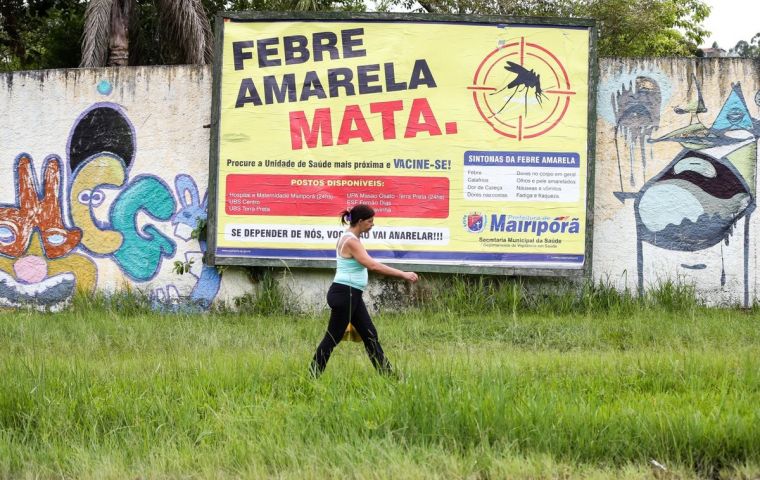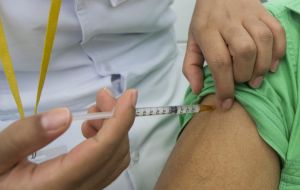MercoPress. South Atlantic News Agency
Massive vaccination, 23.8 million, against yellow fever in Sao Paulo and Rio do Janeiro
 Some 23.8 million people are expected to be vaccinated during the campaign, including 10.3 million in São Paulo and 10 million in Rio de Janeiro.
Some 23.8 million people are expected to be vaccinated during the campaign, including 10.3 million in São Paulo and 10 million in Rio de Janeiro.  One-fifth of the regular dose of yellow fever vaccine still provides immunity against the disease for at least 12 months and likely longer.
One-fifth of the regular dose of yellow fever vaccine still provides immunity against the disease for at least 12 months and likely longer. Brazil launched a mass immunization campaign that will deliver fractional doses of yellow fever vaccine to residents of 69 municipalities in the states of Rio de Janeiro and São Paulo. The strategic plan for the campaign was developed with support from the Pan American Health Organization (PAHO) and the World Health Organization (WHO). It will be the world’s largest vaccination campaign, to date, using fractional doses of yellow fever vaccine.
Some 23.8 million people are expected to be vaccinated during the campaign, including 10.3 million in the state of São Paulo and 10 million in the state of Rio de Janeiro. The state of Bahia is expected to begin vaccinating on 19 February 2018 with an estimated target population of 3.3 million people to be reached with the vaccine.
Fractional dosing, also known as dose-sparing, is a way to extend vaccine supplies, protecting more people and reducing the possibility for disease spread. One-fifth of the regular dose of yellow fever vaccine still provides immunity against the disease for at least 12 months and likely longer. PAHO and WHO recommend the use of fractional doses of yellow fever vaccine in response to large-scale campaign needs. The use of fractional doses of yellow fever vaccine is not recommended as a longer-term strategy or to replace routine immunization practices.
In this campaign, children aged, 9 months to 2 years, and people with medical conditions, among other groups, will receive the standard dose of the vaccine.
PAHO and WHO have provided wide-ranging support to the Brazilian government and to states in responding to yellow fever outbreaks since last year. This has included supplying yellow fever vaccine, purchasing syringes through the PAHO Revolving Fund, disseminating recommendations based on the best available scientific evidence, acquiring special vaccination cards for fractional doses (as was used in the Democratic Republic of the Congo), and working in the field alongside the national and local authorities.
In December 2017, at the request of Brazil’s Ministry of Health, experts from PAHO, the Global Outbreak Alert and Response Network (GOARN) and WHO organized a workshop for yellow fever control specialists in Brasilia on vaccination strategies—including dose fractioning—to be used in the event of outbreaks in large cities.
In 2017, PAHO mobilized more than 20 experts to the states of Bahia, Espírito Santo, Minas Gerais and Rio de Janeiro to assist with Aedes mosquito control to minimize the risk of urban outbreaks, perform detailed data analyses to support strategic actions, train national professionals, conduct epidemiological research on suspected and confirmed cases, and update health care guidelines and protocols.
Yellow Fever is an acute viral hemorrhagic disease transmitted by infected mosquitoes. It can be prevented by an effective, safe and affordable vaccine. To date, all of the human cases of yellow fever in Brazil have been linked to sylvatic mosquitoes. The last case of urban yellow fever in Brazil occurred in 1942.




Top Comments
Disclaimer & comment rulesCommenting for this story is now closed.
If you have a Facebook account, become a fan and comment on our Facebook Page!